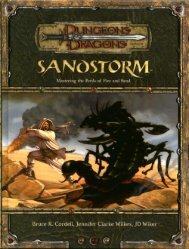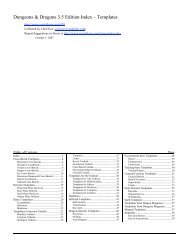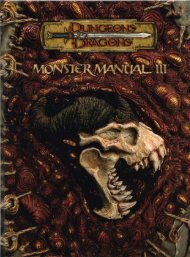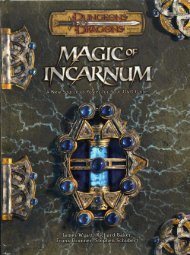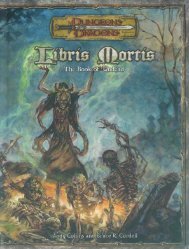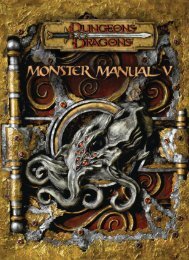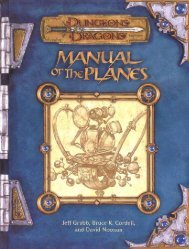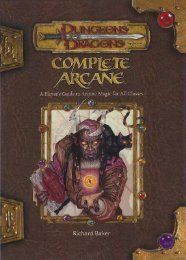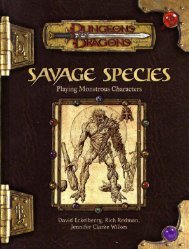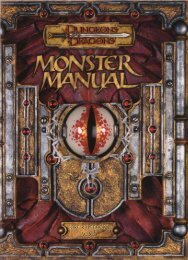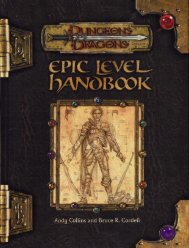CHAPTER 1ELVES36Elves are familiar to anyone who has played in a fantasysetting, and everyone knows how they generally look andact. Nevertheless, they can be as individual as you wish,based on their classes and personal histories. The elves’ racialtendency toward chaos means that each elf in unique. Theelf wizard is a classic type, as are the ranger/archer and thebard. Elf paladins and barbarians are rare, but rogues arequite common.No matter what class you choose, consider spending someskill points in Search even if that’s a cross-class skill for yourcharacter. Because <strong>of</strong> the elf’s racial ability to make a Searchcheck to find secret doors whenever she passes within 5 feet<strong>of</strong> one, an elf with a high Search modifier can be invaluable inan adventuring party. Spot and Listen are also good options,because the racial bonus your character receives alreadyaugments those skills.As an elf, you qualify for some specific feats and prestigeclasses (described in this book) that are unavailable to PCs<strong>of</strong> other races.Feats: Elf Dilettante, Focused Mind, Lightfeet.Prestige Classes: Champion <strong>of</strong> Corellon Larethian,wildrunner.ELVES AS CHARACTERSDue to their racial abilities and cultural predilections, elvesmake superb wizards. However, the elf’s bonus to Dexterityalso stands him in good stead as an archer and a rogue, openinga wide array <strong>of</strong> class options.Barbarian: Elf barbarians are somewhat rare, because theelf’s Constitution penalty makes melee fighting somewhatproblematical and because elves are known for their highdegree <strong>of</strong> culture. Still, the Constitution bonus from theclass’s rage ability can make up for that penalty on a temporarybasis. Elf barbarians usually come from isolated tribes thathave regressed from their previous level <strong>of</strong> civilization overthe course <strong>of</strong> eons.Bard: Elf bards are well respected in their communities,and many have long and impressive adventuring careers. Thegreat beauty for which elves are justly famous makes themwelcome in almost any community, as do the ballads theywrite in their own lyrical tongue. Elves are quite pr<strong>of</strong>icientat raising the courage <strong>of</strong> their companions in combat, as wellas increasing their competence at various skills.Cleric: Elf clerics <strong>of</strong>ten use divine favor, entropic shield,and shield <strong>of</strong> faith in combat. Spiritual weapon makes a nicecompanion to ranged attacks. Searing light is also good forelf clerics because they generally have good ranged attackbonuses. As clerics, elves can play exceptionally strong supportingroles for their parties.Druid: Many elves choose the path <strong>of</strong> the druid simplybecause their race is close to nature. With their racial bowand sword pr<strong>of</strong>iciencies, elves can be exceptionally effectiveas druids.Fighter: Elf fighters generally prefer ranged weapons,particularly the longbow. Their racial bonus to Dexteritymakes them exceptional archers, though they can holdtheir own in melee combat. Their apparent physical frailtydoes not translate into a penalty to Strength, so they can beeffective with nearly any martial weapon. Their penalty toConstitution, however, means they don’t have the hit pointsto endure melee combat as well as most other fighters, so theyare wise to stay out <strong>of</strong> melee range as long as possible.Monk: Most elves are chaotic, so very few <strong>of</strong> them pursuethe path <strong>of</strong> monk. Still, those few elves who take pleasurein order find that their racial pr<strong>of</strong>iciency with the bow andtheir bonus to Dexterity makes them more effective thanmost monks with ranged weapons, and the Dexterity bonusimproves their Armor Class and their effectiveness withcertain monk abilities.Paladin: As with monks, few elves become paladins because<strong>of</strong> the alignment requirement. Those who do choose this path<strong>of</strong>ten worship a deity associated with some other race, becausethe elven gods include no lawful good deities. Some followVandria Gilmadrith, even though she is a lawful neutral deity,since many aspects <strong>of</strong> her dogma appeal to the paladin’s nature.Such a career choice <strong>of</strong>ten effectively severs an elf paladinfrom his community because he tends to seem rather staid.Like elf fighters, elf paladins are most effective with rangedweapons, and they tend to avoid melee combat.For alternative options for the elf paladin, see the elf racialsubstitution levels on page 155.Ranger: The path <strong>of</strong> the ranger is a common choice forelves, who glory in the woodlands. Elf rangers protect theircommunities as well as the surrounding forest, and theymake good use <strong>of</strong> the ranger’s archery specialty. Two-weaponfighting is a less effective choice for elf rangers becausetheir Constitution penalty makes them less effective inmelee combat.For alternative options for the elf ranger, see the elf racialsubstitution levels on page 155.Rogue: Rogue is a good choice for elves because theirracial bonus to Dexterity improves both their Armor Classand most <strong>of</strong> their skill modifiers. Their racial bonuses onListen, Search, and Spot checks also stand them in goodstead as rogues. In addition, elf rogues can infiltrate almostany society because elves are welcomed by most races.Sorcerer: Elf sorcerers <strong>of</strong>ten gravitate toward weaponlikespells and weapon-enhancing spells such as Melf’s acid arrow,true strike, and ray spells. Cat’s grace adds to an elf sorcerer’snatural Dexterity bonus to make him even more effective.Wizard: Wizard is the favored class <strong>of</strong> elves, and for goodreason—they train in the use <strong>of</strong> magic almost from birth.Their long lives lend themselves well to wizardry, whichinvolves lengthy study and book learning. Most elf wizardsaccumulate a significant number <strong>of</strong> spells for their spellbooksover their lifetimes. Those who take item creation feats maymanufacture a large number <strong>of</strong> magic items for their ownuse and for sale outside the community. Many elf wizardsresearch new spells and create new items, taking decades toperfect their techniques.For alternative options for the elf wizard, see the elf racialsubstitution levels on page 157.
Illus. by C. Lukacsurious and active, open but secretive, halflings areamong the least understood races in a DUNGEONS &DRAGONS® campaign. Short in stature and stout inheart, halflings are always on the move, at home inany land but calling none their own. Most otherraces hold a skewed view <strong>of</strong> halflings, despite their generallyfriendly nature and ubiquitous presence.Since halflings rarely put down roots, they tend toknow a great deal about the world and its peoples. However,this knowledge never makes them world-weary or jaded;their innate curiosity and optimism lets them see eachday as a new opportunity. Indeed, it is a rare halfling whocan pass up an opportunity, regardless <strong>of</strong> the danger itmay hold.This chapter provides a window into the world <strong>of</strong> thehalflings and <strong>of</strong>fers a framework upon which players andDMs may expand for their own campaigns.A DAY IN THE LIFEMelo Brownthistle stirred as a small shaft <strong>of</strong> light struckhis pillow. The sunlight shone through several chinks inthe frame <strong>of</strong> his family’s wagon, creating a dazzling display<strong>of</strong> light shafts and motes. Stretching to his full 3-foot 2-inchheight, he rolled over and sniffed the air. “Fresh biscuits andbacon!” he cried, his eyes snapping open.After dressing in his worn brown linen breeches and abright green shirt with long blousy sleeves, he combed hishair and wove it into dozens <strong>of</strong> tiny braids, each <strong>of</strong> whichhe secured with a bead clasp. Then he belted his shirt witha strip <strong>of</strong> blue fabric, tied a blue bandanna over his headat what he hoped was a rakish angle, and pulled on hisknee-high black boots.He gave his little sister a shake to wake her, then steppedout into the cool morning air and surveyed the camp.Twenty-two wagons stood here and there in the grassymeadow where they had stopped last night, situated sothat they could easily be pulled into a more compactcircle should trouble arise. Goats, ponies, and horsesgrazed peacefully nearby, and a few pigs gamboled inthe mud at the edge <strong>of</strong> the campsite. Uncle Gren wasbusily tending to the ho<strong>of</strong> <strong>of</strong> one <strong>of</strong> their ponies, whichseemed to have developed a slight limp, and TheaBrushwhisper, the head teamster, was talking to one<strong>of</strong> the Hillrover clan about their wagon. Childrenwere playing a rough-and-tumble game <strong>of</strong> tag in theopen space at the center <strong>of</strong> the camp, and someonewas cooking breakfast in front <strong>of</strong> every wagon.“Don’t just stand there woolgathering,” said hismother sharply from behind him. “Go and fetch somewater from that stream so I can make some c<strong>of</strong>fee.”Picking up a bucket, Melo ran to do as he was told.37
- Page 2: C R E D I T SD E S I G NSKIP WILLIA
- Page 7 and 8: no elf could predict which memory w
- Page 9 and 10: premium. Thus, each individual can
- Page 11 and 12: The elves have raised one form of e
- Page 13 and 14: do spend time away from one another
- Page 15 and 16: espects during this time, and those
- Page 17 and 18: Stores Master: Charged with keeping
- Page 19 and 20: would be the birthright of any full
- Page 21 and 22: of feet above the forest floor. Mos
- Page 23 and 24: Cleric Training: More than any othe
- Page 25 and 26: ELF HISTORYAND FOLKLOREThe elves cl
- Page 27 and 28: along with her son Hionyron, who wa
- Page 29 and 30: and return her to her people.” In
- Page 31 and 32: Table 1-3: Suffixesd% Suffix Meanin
- Page 34: CHAPTER 1ELVES34tri-level tree home
- Page 39 and 40: the reason for the farmer’s hospi
- Page 41 and 42: Halflings make a visitor feel welco
- Page 43 and 44: Halflings are usually pleasant trav
- Page 45 and 46: Halflings are as eager to experienc
- Page 47: A chief or elder heads each clan, c
- Page 50 and 51: CHAPTER 2HALFLINGS50away from their
- Page 52 and 53: CHAPTER 2HALFLINGS52Illus. by S. Wo
- Page 54 and 55: CHAPTER 2HALFLINGS54to tell how lon
- Page 56 and 57: CHAPTER 2HALFLINGS56the underbrush
- Page 58 and 59: CHAPTER 2HALFLINGSIllus. by T. Baxa
- Page 60 and 61: CHAPTER 2HALFLINGS60Donta muden sit
- Page 63 and 64: and one or more bedrooms. All have
- Page 65 and 66: Illus. by C. Lukacshe cliff-dwellin
- Page 67 and 68: Personality: Raptorans have a reput
- Page 69 and 70: PSYCHOLOGYSome outsiders who have h
- Page 71 and 72: for making a point through a logica
- Page 73 and 74: flock for debate, sometimes invitin
- Page 75 and 76: its eggs. At such times, they toler
- Page 77 and 78: THE RAPTORAN PANTHEONThe typical ra
- Page 79 and 80: Prayers: Prayers to the Stormfather
- Page 81 and 82: “Welcome, friend,” said a human
- Page 83 and 84: year since, and they share the care
- Page 85 and 86:
D: Domain spell. Domains: Protectio
- Page 87 and 88:
characteristics are summarized in t
- Page 90 and 91:
CHAPTER 3RAPTORANS90Authority Figur
- Page 92 and 93:
CHAPTER 4OTHERRACES92a humanlike ra
- Page 94 and 95:
CHAPTER 4OTHERRACES94ment, finding
- Page 96 and 97:
CHAPTER 4OTHERRACES96Illus. by S. B
- Page 98 and 99:
Table 4-1: The CentaurHit Base Atta
- Page 100 and 101:
CHAPTER 4OTHERRACES100nomadic gnoll
- Page 102 and 103:
Table 4-2: The GnollBase Fort Ref W
- Page 104 and 105:
CHAPTER 4OTHERRACES104of the humano
- Page 106 and 107:
CHAPTER 4OTHERRACESsneak attack, bu
- Page 108 and 109:
CHAPTER 5PRESTIGECLASSES108Shadowda
- Page 110 and 111:
CHAPTER 5PRESTIGECLASSESIllus. by W
- Page 112 and 113:
CHAPTER 5PRESTIGECLASSES112the foll
- Page 114 and 115:
CHAPTER 5PRESTIGECLASSES114Entry Re
- Page 116 and 117:
CHAPTER 5PRESTIGECLASSESIllus. by J
- Page 118 and 119:
CHAPTER 5PRESTIGECLASSESLUCKSTEALER
- Page 120 and 121:
CHAPTER 5PRESTIGECLASSESIllus. by J
- Page 122 and 123:
CHAPTER 5PRESTIGECLASSESEL 11: Kuly
- Page 124 and 125:
CHAPTER 5PRESTIGECLASSES124spellcas
- Page 126 and 127:
CHAPTER 5PRESTIGECLASSES126save bon
- Page 128 and 129:
CHAPTER 5PRESTIGECLASSESmore than o
- Page 130 and 131:
CHAPTER 5PRESTIGECLASSES130raptoran
- Page 132 and 133:
CHAPTER 5PRESTIGECLASSES132Table 5-
- Page 134 and 135:
CHAPTER 5PRESTIGECLASSESfriendly—
- Page 136 and 137:
CHAPTER 5PRESTIGECLASSESYou no long
- Page 138 and 139:
CHAPTER 5PRESTIGECLASSES138small fe
- Page 140 and 141:
CHAPTER 5PRESTIGECLASSES140ranger.
- Page 142 and 143:
CHAPTER 5PRESTIGECLASSESIllus. by T
- Page 144 and 145:
CHAPTER 5PRESTIGECLASSESEncountersP
- Page 146 and 147:
CHAPTER 6CHARACTEROPTIONS146Conditi
- Page 148 and 149:
CHAPTER 6CHARACTEROPTIONS148If the
- Page 150 and 151:
CHAPTER 6CHARACTEROPTIONSIllus. by
- Page 152 and 153:
CHAPTER 6CHARACTEROPTIONSIllus. by
- Page 154 and 155:
CHAPTER 6CHARACTEROPTIONSIllus. by
- Page 156 and 157:
Table 6-3: Elf Ranger Racial Substi
- Page 158 and 159:
Table 6-5: Halfling Druid Racial Su
- Page 160 and 161:
CHAPTER 6CHARACTEROPTIONS160Table 6
- Page 162 and 163:
Class SkillsRaptoran fighter substi
- Page 164 and 165:
CHAPTER 7EQUIPMENTAND MAGICIllus. b
- Page 166 and 167:
CHAPTER 7EQUIPMENTAND MAGIC166anoth
- Page 168 and 169:
CHAPTER 7EQUIPMENTAND MAGICTable 7-
- Page 170 and 171:
CHAPTER 7EQUIPMENTAND MAGICIllus. b
- Page 172 and 173:
CHAPTER 7EQUIPMENTAND MAGICIllus. b
- Page 174 and 175:
2nd-Level Ranger SpellWoodland Veil
- Page 176 and 177:
WOODLAND VEILIllusion (Glamer)Level
- Page 178 and 179:
CHAPTER 8CAMPAIGNS INTHE WILD178THE
- Page 180 and 181:
CHAPTER 8CAMPAIGNS INTHE WILDIllus.
- Page 182 and 183:
CHAPTER 8CAMPAIGNS INTHE WILD182(lo
- Page 184 and 185:
CHAPTER 8CAMPAIGNS INTHE WILD184Ski
- Page 186 and 187:
CHAPTER 8CAMPAIGNS INTHE WILD186Tab
- Page 188 and 189:
CHAPTER 8CAMPAIGNS INTHE WILDIllus.
- Page 190 and 191:
CHAPTER 8CAMPAIGNS INTHE WILDIllus.
- Page 192:
APPENDIX19261 Guards are needed to
- Page 195 and 196:
2THE CLIFFThe Rifinti dwelling lies
- Page 198 and 199:
supplies for craftwork. Lamps fuele
- Page 200 and 201:
Nae’fidrim: Female owl companion;
- Page 202 and 203:
Creatures: A cleric is always on du
- Page 204 and 205:
cloak of elvenkind, oil of magic we
- Page 206:
aptoran contraries. If visitors can



